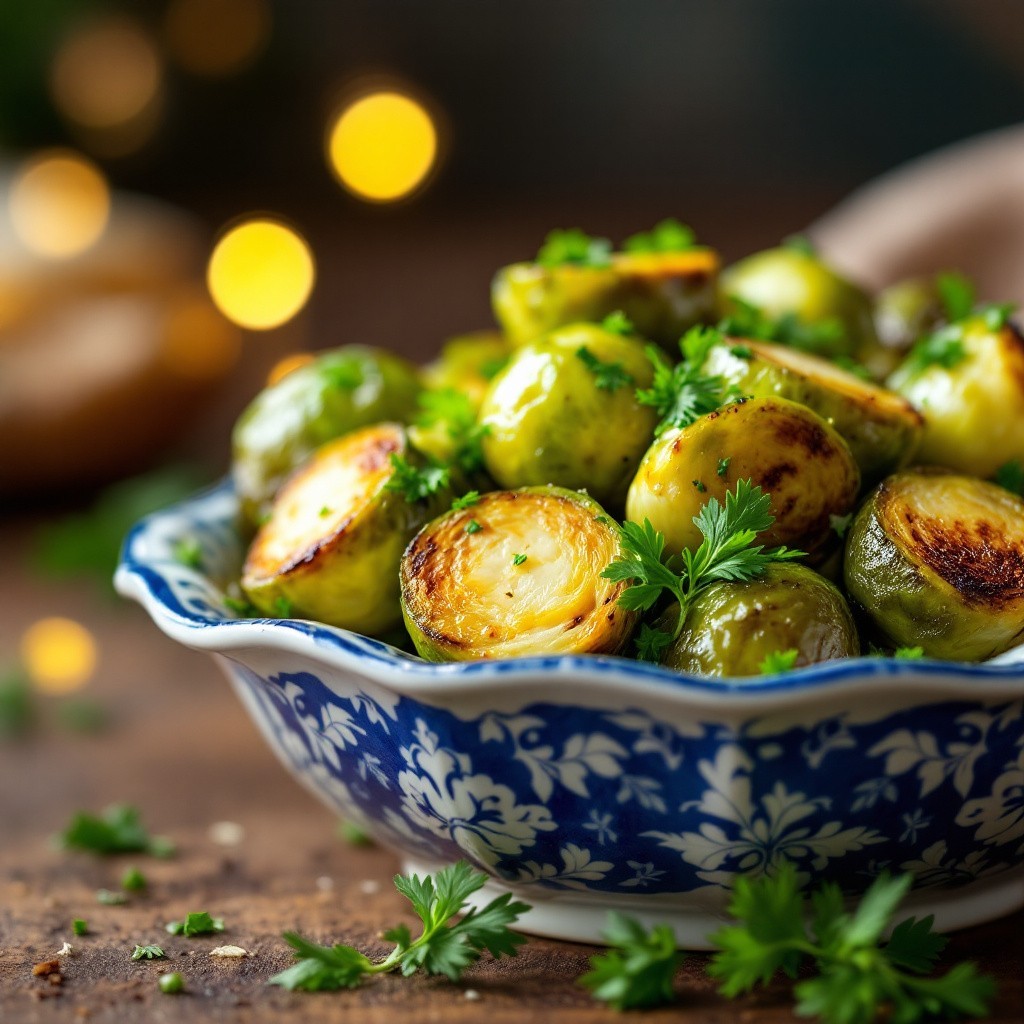Roasted Brussels Sprouts
Roasting tends to be the best method for cooking Brussels Sprouts, as it brings out the natural sweetness and caramelization while keeping the texture crispy on the outside and tender on the inside.
VEGETARIANSIDE DISHEASY TO MAKE
Lourdes Rodriguez
3/7/20254 min read


Vegetable Family:
Brussels sprouts belong to the Brassicaceae family, also known as the cruciferous family. This family also includes vegetables like cabbage, kale, broccoli, cauliflower, and green collard. They are widely cultivated in temperate regions. They grow best in cool climates, and they are commonly found in places like: Europe (especially in the Netherlands, Belgium, and the UK), North America (mainly in the northern parts of the United States and Canada), Northern Europe and parts of Asia like China. They thrive in areas with mild summers and cold winters, which helps enhance their flavor.
Health Benefits of Brussels Sprouts:
Brussels sprouts are rich in vitamins and minerals. They are a good source of fiber, helping to keep your digestive system healthy. Their antioxidant content can help decrease inflammation and improve blood sugar control. Research shows that Brussels sprouts have a sulfur-containing phytochemical called glucosinolate (which is responsible for the distinctive smell and bitter taste), which can help detoxify the body and has anti-fighting properties.
When you prepare Brussels Sprouts the right way, they have a mild flavor. But they are very easy to overcook, which can lead to a strong sulfur-like smell, bitter taste, and mushy texture. For that reason, they often get a bad reputation.
Key Nutrients in 1 Cup of Cooked Brussels Sprouts:
Brussels sprouts are low in calories but packed with essential vitamins, minerals, and fiber, making them a highly nutritious vegetable to include in a balanced diet.
Calories: 38
Vitamin C: 125% DV
Vitamin K: 130% DV
Folate: 23% DV
Vitamin A: 11% DV
Potassium: 15% DV
Fiber: 15% DV
Protein: 3 g
Roasted Brussels Sprouts Recipe
Roasting tends to be the best method as it brings out the natural sweetness and caramelization while keeping the texture crispy on the outside and tender on the inside.
Yield: 2 servings
Ingredients
1 ½ lb. Brussels sprouts
2 Tbsp. avocado oil
Kosher salt to taste
Freshly ground black pepper
Instructions:
Preheat the oven to 400°F (200°C).
Trim the Brussels sprouts by cutting off the ends and removing any yellow or damaged leaves. Slice them in half for even roasting.
In a large bowl, toss the Brussels sprouts with the oil, salt and pepper.
Spread the Brussels sprouts evenly on a baking sheet in a single layer, cut side down.
Roast for 20-25 minutes, flipping halfway through, until golden brown and crispy on the edges.
Suggestions on How to Serve:
As a Side Dish: Roasted Brussels sprouts make a delicious side dish to almost any main course, from roasted meats (chicken, beef, or lamb) to vegetarian options.
Topped with Parmesan: Sprinkle with freshly grated parmesan cheese right after roasting for an extra savory flavor.
As a Salad: Combine roasted Brussels sprouts with mixed greens, nuts (like almonds or walnuts), and a simple vinaigrette.
In a Grain Bowl: Add roasted Brussels sprouts to a grain bowl with quinoa, rice, or couscous, topped with a dressing.
Who may need to avoid Brussels Sprouts:
While Brussels sprouts are packed with nutrients and are a healthy addition to many diets, there are certain individuals who may need to avoid or limit their consumption. As always, it is a good idea to consult a healthcare professional before making significant changes to your diet, especially if you have any underlying health concerns.
Here is a breakdown of who might need to be cautious and why:
People with Gas or Bloating Issues: Brussels sprouts are high in fiber and contain certain types of carbohydrates (known as FODMAPs) that can be hard to digest for some individuals. This can lead to gas, bloating, and discomfort, especially for people with conditions like irritable bowel syndrome (IBS) or other digestive sensitivities.
Individuals with Thyroid Issues (Hypothyroidism): Brussels sprouts, like other cruciferous vegetables (such as broccoli, cabbage, and cauliflower), contain compounds called goitrogens. These can interfere with the thyroid's ability to absorb iodine and produce thyroid hormones. While cooking Brussels sprouts reduces the levels of goitrogens, people with thyroid disorders, especially hypothyroidism, might want to limit their intake or consult with a doctor. However, moderate consumption of cooked Brussels sprouts is generally considered safe for most individuals with thyroid conditions.
People on Blood Thinners (Vitamin K Concerns): Brussels sprouts are rich in vitamin K, which is important for blood clotting. For people on blood-thinning medications (such as warfarin), consuming large amounts of vitamin K-rich foods can interfere with the medication’s effectiveness, potentially increasing the risk of blood clots. Those on these medications should discuss their Brussels sprout intake with their healthcare provider to ensure it is consistent and controlled.
Individuals with Kidney Problems: Brussels sprouts are high in potassium, which is usually beneficial for most people, but it can be a concern for individuals with kidney disease. If the kidneys are not functioning properly, they may struggle to filter out excess potassium, which could lead to dangerous levels in the blood (hyperkalemia). People with kidney issues should monitor potassium intake and consult with a healthcare provider.
People with Food Sensitivities or Allergies: While rare, some people may be allergic to certain components of Brussels sprouts, or they may experience an intolerance to them, leading to symptoms like stomach pain, diarrhea, or skin reactions. If someone has had negative reactions to Brussels sprouts or other cruciferous vegetables, they should avoid them.
Young Children (In Large Amounts): While Brussels sprouts are nutritious, they can be tough for young children to digest, especially if eaten in large quantities. Their stomachs may not be able to handle the high fiber content, which can lead to discomfort. It is best to serve Brussels sprouts in smaller portions and ensure they are cooked well to make them easier to digest.
Individuals with a Sensitive Stomach or Gastritis: The high fiber content and certain compounds in Brussels sprouts (like sulfur-containing compounds) can sometimes irritate individuals with gastritis or other stomach issues, leading to discomfort, acid reflux, or bloating.
Important: If you have any doubts about incorporating this food into your diet, it is always a good idea to consult with your dietician or doctor.
Plenitaste
Inspiring healthy, global recipes for everyone.
contact me:
Recipe
plenitaste@gmail.com
© 2025. All rights reserved.
